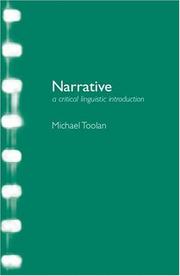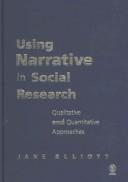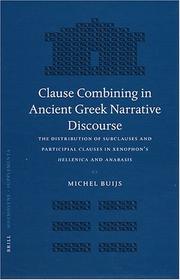| Listing 1 - 8 of 8 |
Sort by
|

ISBN: 0415231744 0415231752 9780415231756 Year: 2005 Publisher: London : Routledge,
Abstract | Keywords | Export | Availability | Bookmark
 Loading...
Loading...Choose an application
- Reference Manager
- EndNote
- RefWorks (Direct export to RefWorks)
Narrative explores a range of written, spoken, literary and non-literary narratives. It shows what systematic attention to language can reveal about the narratives themselves, their tellers, and those to whom they are addressed. Topics examined include plot structure, time manipulations, point of view, oral narratives and children's stories. This classic text has been substantially rewritten to incorporate recent developments in theory and new technologies, and to make it more usable as a course book. New materials include sections on film, surprise and suspense, and online news stories. The section on children's narratives has been updated, and the discussion of newspaper stories incorporates contemporary examples. There are new exercises which relate closely to the chapter content and new sections on further reading.
Book
ISBN: 2870374968 9782870374962 Year: 2005 Volume: 3 Publisher: Namur : Presses universitaires de Namur : Cedocef,
Abstract | Keywords | Export | Availability | Bookmark
 Loading...
Loading...Choose an application
- Reference Manager
- EndNote
- RefWorks (Direct export to RefWorks)
Cette étude sur le discours narratif et sur la manière de l'enseigner aux élèves se rattache à trois questions, fondamentales pour l'auteur : à quoi celui qui aime la fiction peut-il être sensible ? De quels mots a-t-il besoin pour le dire ? De quelles connaissances doit-il être pourvu pour être amateur ?
Narration. --- Analyse du discours narratif. --- Littérature --- Création littéraire --- Étude et enseignement.
Book
ISBN: 8815106871 Year: 2005 Publisher: Bologna : il Mulino,
Abstract | Keywords | Export | Availability | Bookmark
 Loading...
Loading...Choose an application
- Reference Manager
- EndNote
- RefWorks (Direct export to RefWorks)
Narration (Rhetoric). --- Fiction --- History and criticism. --- Narration (Rhetoric) --- Narration --- Analyse du discours narratif --- Manuels d'enseignement
Book
ISBN: 220034015X 9782200340155 Year: 2005 Publisher: Paris : Armand Colin,
Abstract | Keywords | Export | Availability | Bookmark
 Loading...
Loading...Choose an application
- Reference Manager
- EndNote
- RefWorks (Direct export to RefWorks)
Audio-visual --- Motion pictures --- Audiovisuel --- Cinéma --- Criticism --- Fictions --- Critique --- Narration (Rhetoric) --- Television programs --- Plots, themes, etc. --- Narration (Rhetoric). --- Cinéma --- Audiovisual - Fictions - Criticism. --- Fictions. --- Analyse du discours narratif --- Feuilletons télévisés --- Personnages à la télévision --- Personnages de cinéma --- Récit filmique
Book
ISBN: 2804150100 9782804150105 Year: 2005 Publisher: Bruxelles De Boeck & Larcier. Département Duculot
Abstract | Keywords | Export | Availability | Bookmark
 Loading...
Loading...Choose an application
- Reference Manager
- EndNote
- RefWorks (Direct export to RefWorks)
Schoolbooks - Didactic material --- Romans en novellen --- Romans et nouvelles --- Reading comprehension. --- Compréhension de la lecture --- Compréhension de la lecture --- Narration (Rhetoric) --- Discourse analysis, Narrative. --- Fiction --- Narration --- Discours narratif --- Roman --- Technique. --- Technique

ISBN: 1412900409 1412900417 1446227383 0857020242 9786611362089 1281362085 1848600666 9781412900417 Year: 2005 Publisher: Thousand Oaks Sage
Abstract | Keywords | Export | Availability | Bookmark
 Loading...
Loading...Choose an application
- Reference Manager
- EndNote
- RefWorks (Direct export to RefWorks)
"An elegantly written, scholarly and accessible text. Jane Elliott shows a sophisticated appreciation of contemporary methodological developments, and makes a persuasive case for the use of narrative approaches in both qualitative and quantitative research. The book challenges and advances debates about combining methods, and shows how stories can work within and across conventional research boundaries. It is a truly original contribution to the literature." -- Amanda Coffey Cardiff School of Social Sciences This is a lucid and accessible introduction to narrative methods in social research. It is also an important book about the nature, role and theoretical basis of research methodology in general. Jane Elliott instructs the reader on the basic methods and methodological assumptions that form the basis of narrative methods. She does so in a way that is practical and accessible and in a way that will make the book a favourite with students and experienced researchers alike. Elliott argues that both qualitative and quantitative methods are characterized by a concern with narrative, and that our research data can best be analyzed if it is seen in narrative terms. In concrete, step-by-step terms she details for the reader how to go about collecting data and how to subject that data to narrative analysis, while at the same time placing this process in its wider theoretical context. She works across the traditional quantitative/qualitative divide to set out the ways in which narrative researchers can uncover such issues as social change, causality and social identity. She also shows how the techniques and skills used by qualitative researchers can be deployed when doing quantitative research and, similarly, how qualitative researchers can sometimes profit from using quantitative skills and techniques.
Methods in social research (general) --- Verhalen. --- --Research. --- Discours narratif. --- Discourse analysis, Narrative. --- Narration (Rhetoric). --- Narration. --- Pedagogiek en onderwijskunde --. --- Sciences sociales --- Sociaal-wetenschappelijk onderzoek. --- Social sciences --- Recherche. --- Research. --- Discourse analysis, Narrative --- Narration (Rhetoric) --- #SBIB:303H32 --- Social science research --- Narrative (Rhetoric) --- Narrative writing --- Rhetoric --- Narratees (Rhetoric) --- Narrative discourse analysis --- Research --- Waarneming en participerende waarneming, gecontroleerde observatie, groepsdiscussie (vragenlijsten, interviews, experimenten)

ISSN: 01698958 ISBN: 9004142509 9786610867622 9047406974 1280867620 1433705214 9789004142503 Year: 2005 Volume: 260 Publisher: Leiden ; Boston : Brill,
Abstract | Keywords | Export | Availability | Bookmark
 Loading...
Loading...Choose an application
- Reference Manager
- EndNote
- RefWorks (Direct export to RefWorks)
This study describes the usage of subclauses and participial clauses in Xenophon’s Hellenica and Anabasis , with additional examples from other texts, using a text grammar-oriented approach, which can map more factors underlying the distribution of these clauses, and offers a more satisfactory explanation of a larger number of instances than is possible using the traditional sentence-level approach. The discourse-analytic description of the different clause types focuses on how relations are coded by means of subordinating conjunctions, the differences in form and function as discourse boundary markers between preposed, sentence-initially placed subclauses and participles, and the differences between clause types with respect to the information flow in on-going discourse. The discussion of many examples from the work of Xenophon makes this book interesting for both linguists and classical philologists.
Greek language --- Discourse analysis, Narrative --- Grec (Langue) --- Discours narratif --- Clauses. --- Propositions --- Xenophon. --- Clauses --- Narration (Rhetoric) --- Rhetoric, Ancient --- Ancient rhetoric --- Classical languages --- Greek rhetoric --- Latin language --- Latin rhetoric --- Indo-European languages --- Classical philology --- Greek philology --- History --- Rhetoric --- Xenophon --- Xenofon --- Xenofoon --- Xenophoon --- Senofonte --- Language. --- a Xenophon --- Jenofonte --- Jenófanes --- Ksenofont --- Xenofón --- Kısenofon --- Pseudo-Senofonte --- Kʻsenopʻonti --- Pseudo-Xenophon --- כסינופון --- زينوفون --- كزنوفون --- گزنفون --- Xenofont --- Ξενοφῶν --- Rhetoric, Ancient. --- Narratees (Rhetoric) --- Xenophon. - Hellenica --- Xenophon. - Anabasis
Book
ISBN: 2713220289 9782713220289 Year: 2005 Volume: 108 Publisher: Paris EHESS
Abstract | Keywords | Export | Availability | Bookmark
 Loading...
Loading...Choose an application
- Reference Manager
- EndNote
- RefWorks (Direct export to RefWorks)
Si la narratologie constitue un programme de recherche clairement défini, elle ne cesse, depuis quelques années, de se complexifier, de se diversifier. Aujourd'hui, elle privilégie une démarche transdisciplinaire ainsi qu'une réflexion qui confronte le récit à d'autres phénomènes artistiques et, plus largement, représentationnels. Au croisement de la rhétorique et de la théorie du récit, la métalepse narrative semble brouiller les distinctions établies, notamment celle du monde du narré et du monde de la narration.Pratique plus ancienne que son nom, la métalepse est aussi plus diversifiée qu'on ne le croyait naguère, car l'entorse au pacte de représentation n'est pas seulement l'affaire du récit... Les contributions rassemblées ici témoignent de cet élargissement d'un concept, dessinant la configuration d'un phénomène à faces multiples, paradoxal dans son essence, et que l'on peut étudier désormais en distinguant métalepse rhétorique et métalepse ontologique.Sorte de "court-circuit" dans l'organisation du discours, la métalepse modifie, substantiellement, la donne du structuralisme, pour lequel la métaphore et la métonymie sont les figures de prédilection. Procédé troublant et rebelle, la métalepse nous rappelle que dans le récit fictionnel, contrairement au récit factuel, le monde narré est ontologiquement dépendant de l'acte de narration qui l'engendre, mettant en relief le corollaire inavoué de la formule de Coleridge : la "suspension volontaire de la crédulité".
Point of view (Literature) --- Metonyms --- Narration (Rhetoric) --- Fiction --- Discourse analysis, Narrative --- Technique --- 82-3 "17" --- Proza. Fictie. Narratologie--18e eeuw. Periode 1700-1799 --- Metalepsis --- 82-3 "17" Proza. Fictie. Narratologie--18e eeuw. Periode 1700-1799 --- 82.091 --- 82-3 --- 82-3 Proza. Fictie. Narratologie --- Proza. Fictie. Narratologie --- 82.091 Vergelijkende literatuurstudie --- Vergelijkende literatuurstudie --- Figures of speech --- Literary style --- Literary rhetorics --- Literary semiotics --- Discourse analysis [Narrative ] --- 82-3 Fiction. Prose narrative --- Fiction. Prose narrative --- Fiction - Technique --- Analyse du discours narratif. --- Métalepse. --- Théorie de la fiction.
| Listing 1 - 8 of 8 |
Sort by
|

 Search
Search Feedback
Feedback About UniCat
About UniCat  Help
Help News
News